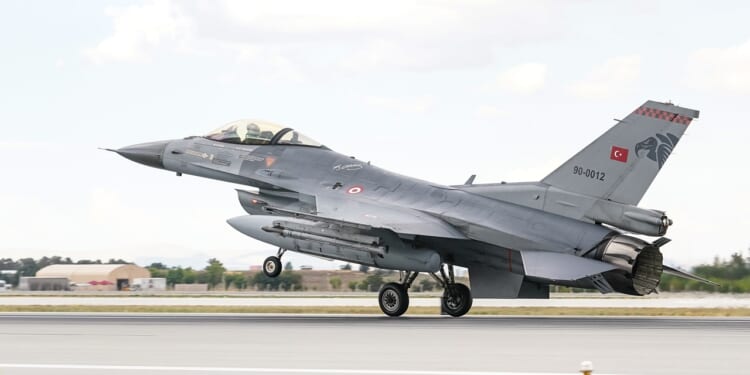Turkey’s Bozdoğan and Gökdoğan missiles could revolutionize the Turkish defense industry and boost its export potential—if they could be proven to work reliably.
Turkey’s path to regional dominance appears unstoppable. Recently, the Islamist-adjacent nation successfully carried out a live-firing test of two domestically developed air-to-air missiles, the Bozdoğan and the Gökdoğan from an F-16 warplane.
These missiles were developed under the GÖKTUĞ program by TÜBİTAK SAGE, Turkey’s scientific and technological research arm. This advancement by Turkey’s Armed Forces is being framed as a necessary step toward Turkish self-reliance in defense, particularly moving away from the country’s dependence on Western (specifically American) systems—notably the US AIM-9X Sidewinder and AIM-120 AMRAAM.
Understanding the Turkish-made weapons is essential to understand why Ankara is ecstatic over the prospect of these weapons being readily available to their military.
About the Bozdoğan and Gökdoğan Missiles
The Bozdoğan is a short range (within visual range) air-to-air missile using an imaging infrared (IIR) seeker, with thrust-vector control for high maneuverability, reportedly effective in dogfights at around the 20–30-kilometer range, according to Defence Security Asia, a trade publication.
The Gökdoğan is a beyond-visual-range (BVR) missile, using an active radar seeker and advanced mid-flight guidance algorithms, claimed to have “hit-to-kill” capability (direct impact rather than proximity detonation), with a stated range of over 65 kilometers.
Apparently, Ankara wants future variants to have even longer—as far as 400 kilometers—range, as well as ramjet propulsion, making these missiles comparable to systems from China, Russia, and India.
As this technology develops, there are naturally going to be new opportunities for export. Indeed, Turkey has become a real competitor on the global arms market for affordable, advanced weapons platforms. Nations like Azerbaijan, Pakistan, Qatar, Malaysia, and others all buy from Ankara—and it intends for these new missiles to become staples in their foreign sales as well.
Who Might Turkey Use Their New Missiles Against?
Of course, the media coverage surrounding these weapons has been overwhelmingly positive. And this is an important achievement for the Turks. But the reports are light on details. For instance, the exact operational readiness, integration into Turkey’s Armed Forces, and reliability under combat conditions are all relatively unknown, given the newness of the system. It will be sometime before anyone has any idea of just how good these weapons really are.
Still, this is an important development. Air-to-air missiles are a key enabler for enhanced air superiority and deterrence. Given Turkey’s ongoing feuds with neighboring Greece, its tense relationship with Russia, and its increased involvement in the Middle East, these weapons will be helpful in Ankara’s grand strategy of regional supremacy.
Should these missiles prove viable, their successful development will fundamentally alter the dynamics in all the conflicts that Turkey finds itself in. It will also potentially positively impact Turkey’s bottom line, should these weapons prove popular among foreign buyers. That, in turn, will enhance Turkey’s indigenous arms production—all of which further insulates the country from any Western sanctions or reprisals against Ankara for whatever problems may arise between Turkey and its Western partners.
Despite the positive press, and the significant development these new systems represent, it would be wise to treat these reports with caution—if only because the weapons are still so new and unproven in combat. It is clear, however, that Turkey is serious about its quest to become a great regional power.
About the Author: Brandon J. Weichert
Brandon J. Weichert is a senior national security editor at The National Interest. Recently, Weichert became the host of The National Security Hour on America Outloud News and iHeartRadio, where he discusses national security policy every Wednesday at 8pm Eastern. He is also a contributor at Popular Mechanics and has consulted regularly with various government institutions and private organizations on geopolitical issues. Weichert’s writings have appeared in multiple publications, including The Washington Times, National Review, The American Spectator, MSN, The Asia Times, and others. His books include Winning Space: How America Remains a Superpower, Biohacked: China’s Race to Control Life, and The Shadow War: Iran’s Quest for Supremacy. His newest book, A Disaster of Our Own Making: How the West Lost Ukraine is available for purchase wherever books are sold. He can be followed via Twitter @WeTheBrandon.
Image: Shutterstock / EvrenKalinbacak.
















